Your Cart is Empty
- Shop
- About
- Learn
- Free Domestic Shipping Over $50
- +1(800)929-8935
- Login
- Free Domestic Shipping Over $50
- +1(800)929-8935

In our daily lives, stress is a common experience for many. While numerous factors contribute to stress levels, one aspect that is often overlooked is the impact of our diet.
This article explores how integrating certain foods into our diets can help manage and reduce stress. By focusing on nutritional choices that support our mental well-being, we can take a step towards a less stressful life.1

The connection between diet and stress is more significant than many might think. What we consume can directly affect our body's ability to handle stress. Nutrients from our food can influence the production and regulation of stress hormones like cortisol and adrenaline.1
A balanced diet can help in maintaining stable blood sugar levels, reducing the incidence of mood swings, and supporting overall mental health. Consequently, making informed dietary choices becomes a crucial part of managing stress effectively.
Before discussing specific foods that can help mitigate stress, it's important to understand the nutritional basis for their effects.
Foods rich in vitamins, minerals, and antioxidants can enhance the body's resilience to stress. For example, omega-3 fatty acids found in fatty fish have been shown to reduce stress hormone levels in the body, while the probiotics in yogurt can improve gut health, which is linked to mood regulation.2, 7
As we explore these foods, consider how their nutritional content contributes to their stress-reducing properties.
Vegetables like spinach and kale are packed with magnesium, a mineral essential for regulating neurotransmitters and reducing stress levels. Including these greens in your diet can help calm the nervous system and improve your response to stress.3
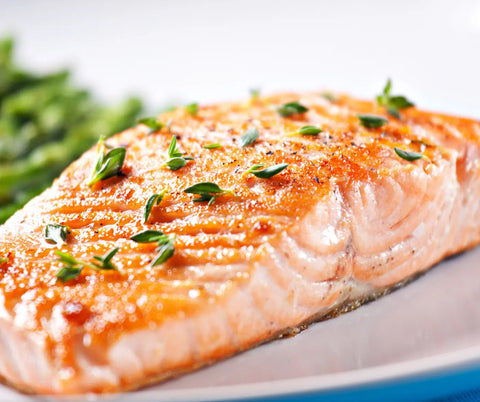
These fish are rich sources of omega-3 fatty acids, which have been shown to reduce inflammation and lower levels of stress hormones like cortisol. Regular consumption of salmon, mackerel, and sardines can support brain health and mood regulation.4
Small but mighty, blueberries boast high levels of antioxidants and vitamin C, making them powerful stress busters.5
They counteract stress-induced cellular damage and support mental well-being, helping to alleviate anxiety and improve mood.
Almonds, walnuts, and pumpkin seeds are not only delicious but also nourish the brain with healthy fats, magnesium, and fiber.
These nutrients help combat stress by reducing inflammation and stabilizing blood sugar levels.3
This creamy fruit is loaded with B vitamins, known to relieve stress by supporting healthy nerve and brain cells.
Avocados are also high in monounsaturated fat, contributing to improved brain health and lowered stress.6
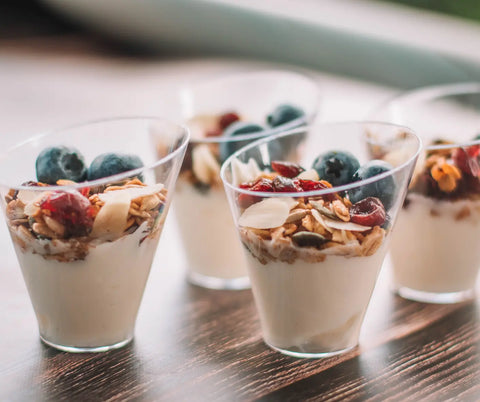
Foods like yogurt, kimchi, sauerkraut, and kefir are rich in probiotics, which benefit gut health and mood.
A healthy gut is linked to a lower stress response, as much of the body's serotonin (a mood stabilizer) is produced in the gut.7
Oats, quinoa, and brown rice contain complex carbohydrates that help the body release serotonin, a neurotransmitter that promotes well-being and reduces stress.8
They also maintain steady blood sugar levels, preventing mood swings
A bit of dark chocolate can not only satisfy your sweet tooth but also lower stress levels.
Its high content of antioxidants is effective in reducing stress hormones in the body, making it a delicious way to fight stress.9
These fruits are high in vitamin C, which has been shown to reduce stress and boost the immune system.10
Incorporating oranges, lemons, and strawberries into your diet can help keep stress at bay.
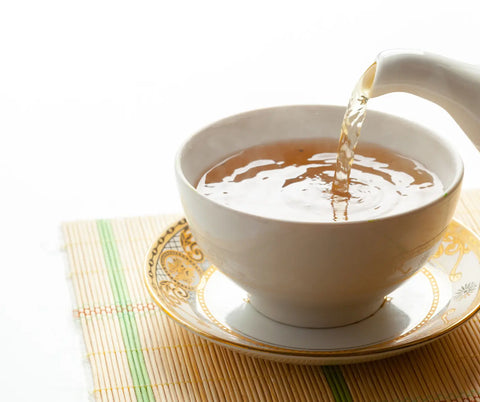
Rich in theanine, a natural relaxant, green tea can help relieve stress and anxiety.
This tea is also packed with antioxidants, supporting overall health and providing a gentle energy boost without the jitters associated with coffee.9
This spice contains curcumin, a compound with potent anti-inflammatory and antioxidant properties.
It can improve brain function and lower anxiety levels by reducing inflammation and oxidative stress that can be exacerbated by stress.11
Known for its calming properties, chamomile tea is a traditional remedy for insomnia and anxiety.12
Drinking chamomile tea can help reduce stress, promote relaxation, and improve sleep quality.
As a complete protein, eggs contain essential amino acids needed for stress management.
They're also rich in choline, a nutrient that supports brain health and reduces stress.13
Rich in vitamins, minerals, and antioxidants, sweet potatoes help combat stress by lowering high blood pressure and stabilizing blood sugar levels, thanks to their high fiber content.14
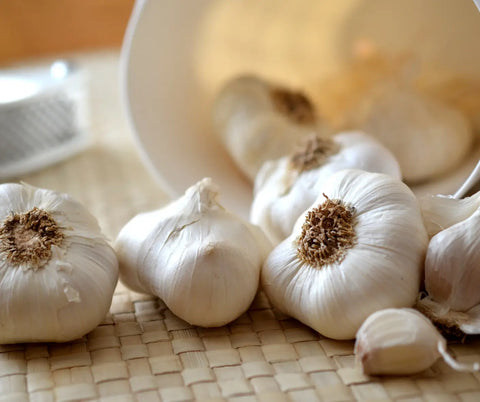
Garlic is not only a culinary staple but also a source of powerful compounds that boost the immune system and reduce stress by combating inflammation and lowering blood pressure.15
These legumes are excellent sources of B vitamins, crucial for brain health and stress management.
They also provide a steady supply of energy, helping to stabilize mood and reduce anxiety.16
Lean cuts of beef and pork are high in amino acids and B vitamins, which support mood and reduce stress.16
They can be a healthy part of a stress-reducing diet when consumed in moderation.
Hydrating and rich in vitamins A and C, watermelon helps reduce stress by nourishing the body and providing essential nutrients needed for stress management.17
High in folate, asparagus can help maintain a stable mood and reduce stress.18
This vegetable is also rich in fiber, supporting digestive health and overall well-being.
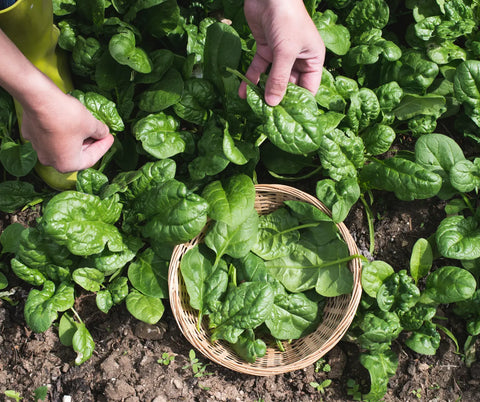
Another leafy green high in magnesium, spinach supports the body's stress response and helps maintain a calm and focused state of mind.3
Integrating spinach into meals can provide a significant boost to your stress management efforts.
Incorporating stress-reducing foods into your daily meals requires some planning but is well worth the effort. Here are practical ways to ensure these powerful nutrients are part of your everyday diet:
Start with Breakfast: Incorporate whole grains like oats or whole grain bread, which can help produce serotonin. Top it with nuts, seeds, or fresh berries for an added stress-fighting boost.
Snack Wisely: Opt for snacks that include ingredients like dark chocolate, yogurt, or a handful of nuts. These can be both satisfying and beneficial for your stress levels.
Incorporate Vegetables and Fruits at Every Meal: Add a side of leafy greens, sweet potatoes, or slices of avocado to your lunch and dinner. Snack on citrus fruits or watermelon to keep hydrated and energized.
Choose Lean Proteins: Incorporate sources of omega-3 fatty acids like salmon or add chickpeas and lentils to your salads and soups for a protein boost that also combats stress.
Stay Hydrated with Healthy Beverages: Replace sugary drinks with green tea or water infused with citrus fruits or strawberries to keep you hydrated and stress-free.
By making these small adjustments, you can enjoy a diet that not only tastes good but also reduces stress levels.

While diet plays a crucial role in managing stress, incorporating lifestyle changes can enhance your body's ability to cope:
Regular Exercise: Engaging in physical activity releases endorphins, the body's natural stress relievers. Aim for at least 30 minutes of exercise most days of the week.
Quality Sleep: Ensure you're getting enough restful sleep, as a lack of sleep can exacerbate stress. Create a relaxing bedtime routine and aim for 7-9 hours of sleep per night.
Mindfulness and Relaxation Techniques: Practices like meditation, deep breathing exercises, or yoga can significantly lower stress levels and improve your overall sense of well-being.
Stay Connected: Maintain a supportive network of friends and family. Social interaction can provide a great outlet for stress.
Time Management: Learn to say no and prioritize your tasks to reduce overwhelm. Organizing your day can help manage stress more effectively.

While dietary and lifestyle changes can significantly impact stress management, they may not be enough for everyone.
If you find yourself overwhelmed by stress, experiencing symptoms of anxiety or depression, or if stress is affecting your daily life, it's important to seek professional help.
A healthcare provider can offer strategies and treatments tailored to your needs, ensuring you get the appropriate support to manage your stress.
Managing stress effectively is a multifaceted approach that includes a balanced diet rich in stress-reducing foods, lifestyle changes, and seeking help when necessary.
By incorporating foods that combat stress into your diet and adopting healthy lifestyle habits, you can improve your body's resilience to stress and enhance your overall quality of life.
Remember, taking proactive steps toward managing stress is crucial for maintaining both your physical and mental health.
Stress-fighting foods are a great start—but Seredyn Complete Calm offers extra support when you need it most. With calming plant extracts and amino acids, Seredyn helps reduce worry and soothe the restless mind.
Pair your stress-reducing diet with Seredyn for deeper calm and clarity.
What foods are best for reducing stress and anxiety?
Foods rich in magnesium, omega-3 fatty acids, and vitamin C, such as leafy greens, salmon, and citrus fruits, are excellent for reducing stress and anxiety.
Can a healthy diet improve my mental health?
Yes, a diet high in stress-reducing nutrients can significantly improve mental health by lowering stress levels and enhancing mood.
How does green tea help in stress management?
Green tea contains L-theanine, an amino acid that promotes relaxation and helps manage stress effectively.
Are there any natural remedies to combat stress?
Natural remedies for stress include consuming stress-reducing foods, practicing mindfulness, regular physical activity, and ensuring adequate sleep.
What lifestyle changes can support stress reduction?
Regular exercise, quality sleep, mindfulness practices, and a balanced diet are key lifestyle changes that support stress reduction.
Bremner JD, Moazzami K, Wittbrodt MT, Nye JA, Lima BB, Gillespie CF, Rapaport MH, Pearce BD, Shah AJ, Vaccarino V. Diet, Stress and Mental Health. Nutrients. 2020 Aug 13;12(8):2428. doi: 10.3390/nu12082428. PMID: 32823562; PMCID: PMC7468813.
Lobo V, Patil A, Phatak A, Chandra N. Free radicals, antioxidants and functional foods: Impact on human health. Pharmacogn Rev. 2010 Jul;4(8):118-26. doi: 10.4103/0973-7847.70902. PMID: 22228951; PMCID: PMC3249911.
Cuciureanu MD, Vink R. Magnesium and stress. In: Vink R, Nechifor M, editors. Magnesium in the Central Nervous System [Internet]. Adelaide (AU): University of Adelaide Press; 2011. Available from: https://www.ncbi.nlm.nih.gov/books/NBK507250/
Madison AA, Belury MA, Andridge R, Renna ME, Rosie Shrout M, Malarkey WB, Lin J, Epel ES, Kiecolt-Glaser JK. Omega-3 supplementation and stress reactivity of cellular aging biomarkers: an ancillary substudy of a randomized, controlled trial in midlife adults. Mol Psychiatry. 2021 Jul;26(7):3034-3042. doi: 10.1038/s41380-021-01077-2. Epub 2021 Apr 20. PMID: 33875799; PMCID: PMC8510994.
Duffy, K. B., Spangler, E. L., Devan, B. D., Guo, Z., Bowker, J. L., Janas, A. M., Hagepanos, A., Minor, R. K., DeCabo, R., Mouton, P. R., Shukitt-Hale, B., Joseph, J. A., & Ingram, D. K. (2008). A blueberry-enriched diet provides cellular protection against oxidative stress and reduces a kainate-induced learning impairment in rats. Neurobiology of aging, 29(11), 1680–1689. https://doi.org/10.1016/j.neurobiolaging.2007.04.002
Alvizouri-Muñoz M, Carranza-Madrigal J, Herrera-Abarca JE, Chávez-Carbajal F, Amezcua-Gastelum JL. Effects of avocado as a source of monounsaturated fatty acids on plasma lipid levels. Arch Med Res. 1992 Winter;23(4):163-7. PMID: 1308699.
Ma T, Jin H, Kwok LY, Sun Z, Liong MT, Zhang H. Probiotic consumption relieved human stress and anxiety symptoms possibly via modulating the neuroactive potential of the gut microbiota. Neurobiol Stress. 2021 Jan 12;14:100294. doi: 10.1016/j.ynstr.2021.100294. PMID: 33511258; PMCID: PMC7816019.
Ross AB, Shertukde SP, Livingston Staffier K, Chung M, Jacques PF, McKeown NM. The Relationship between Whole-Grain Intake and Measures of Cognitive Decline, Mood, and Anxiety-A Systematic Review. Adv Nutr. 2023 Jul;14(4):652-670. doi: 10.1016/j.advnut.2023.04.003. Epub 2023 Apr 19. PMID: 37085091; PMCID: PMC10334137.
Lobo V, Patil A, Phatak A, Chandra N. Free radicals, antioxidants and functional foods: Impact on human health. Pharmacogn Rev. 2010 Jul;4(8):118-26. doi: 10.4103/0973-7847.70902. PMID: 22228951; PMCID: PMC3249911.
Moritz B, Schmitz AE, Rodrigues ALS, Dafre AL, Cunha MP. The role of vitamin C in stress-related disorders. J Nutr Biochem. 2020 Nov;85:108459. doi: 10.1016/j.jnutbio.2020.108459. Epub 2020 Jul 3. PMID: 32745879.
Sharifi-Rad J, Rayess YE, Rizk AA, Sadaka C, Zgheib R, Zam W, Sestito S, Rapposelli S, Neffe-Skocińska K, Zielińska D, Salehi B, Setzer WN, Dosoky NS, Taheri Y, El Beyrouthy M, Martorell M, Ostrander EA, Suleria HAR, Cho WC, Maroyi A, Martins N. Turmeric and Its Major Compound Curcumin on Health: Bioactive Effects and Safety Profiles for Food, Pharmaceutical, Biotechnological and Medicinal Applications. Front Pharmacol. 2020 Sep 15;11:01021. doi: 10.3389/fphar.2020.01021. PMID: 33041781; PMCID: PMC7522354.
Srivastava JK, Shankar E, Gupta S. Chamomile: A herbal medicine of the past with bright future. Mol Med Rep. 2010 Nov 1;3(6):895-901. doi: 10.3892/mmr.2010.377. PMID: 21132119; PMCID: PMC2995283.
Yamashita S, Kawada N, Wang W, Susaki K, Takeda Y, Kimura M, Iwama Y, Miura Y, Sugano M, Matsuoka R. Effects of egg yolk choline intake on cognitive functions and plasma choline levels in healthy middle-aged and older Japanese: a randomized double-blinded placebo-controlled parallel-group study. Lipids Health Dis. 2023 Jun 20;22(1):75. doi: 10.1186/s12944-023-01844-w. PMID: 37340479; PMCID: PMC10280906.
Laveriano-Santos EP, López-Yerena A, Jaime-Rodríguez C, González-Coria J, Lamuela-Raventós RM, Vallverdú-Queralt A, Romanyà J, Pérez M. Sweet Potato Is Not Simply an Abundant Food Crop: A Comprehensive Review of Its Phytochemical Constituents, Biological Activities, and the Effects of Processing. Antioxidants (Basel). 2022 Aug 25;11(9):1648. doi: 10.3390/antiox11091648. PMID: 36139723; PMCID: PMC9495970.
Bayan L, Koulivand PH, Gorji A. Garlic: a review of potential therapeutic effects. Avicenna J Phytomed. 2014 Jan;4(1):1-14. PMID: 25050296; PMCID: PMC4103721.
Sofyan M, Fitriani DY, Friska D, Basrowi RW, Fuady A. B Vitamins, work-related stress and emotional mental disorders: a cross-sectional study among nurses in Indonesia. Nurs Open. 2022 Jul;9(4):2037-2043. doi: 10.1002/nop2.1213. Epub 2022 Apr 17. PMID: 35434916; PMCID: PMC9190671.
Naz A, Butt MS, Sultan MT, Qayyum MM, Niaz RS. Watermelon lycopene and allied health claims. EXCLI J. 2014 Jun 3;13:650-60. PMID: 26417290; PMCID: PMC4464475.
Asbaghi O, Ghanavati M, Ashtary-Larky D, Bagheri R, Rezaei Kelishadi M, Nazarian B, Nordvall M, Wong A, Dutheil F, Suzuki K, Alavi Naeini A. Effects of Folic Acid Supplementation on Oxidative Stress Markers: A Systematic Review and Meta-Analysis of Randomized Controlled Trials. Antioxidants (Basel). 2021 May 28;10(6):871. doi: 10.3390/antiox10060871. PMID: 34071500; PMCID: PMC8230016.